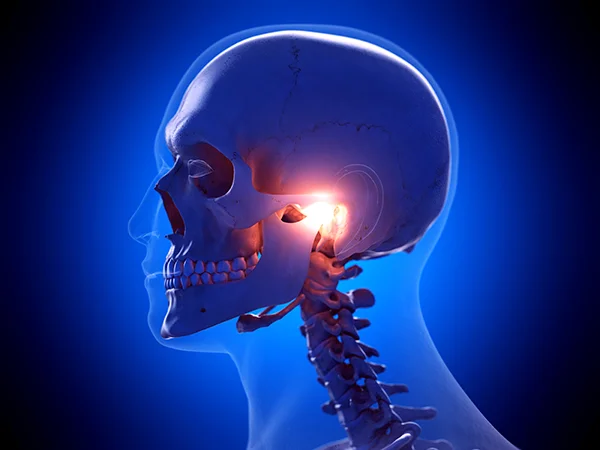The Quiet Side Effect of Anxiety with Tmj Problems
Posted on 8/15/2024 by Surf City Oral and Maxillofacial Surgery |
 The temporomandibular joint (TMJ) connects your jawbone to your skull. It's a complex hinge that allows you to open and close your mouth, chew, and talk. When this joint is working properly, you likely don't even notice it. But when it becomes inflamed or irritated, it can cause a range of problems, including pain, clicking, and difficulty chewing. The temporomandibular joint (TMJ) connects your jawbone to your skull. It's a complex hinge that allows you to open and close your mouth, chew, and talk. When this joint is working properly, you likely don't even notice it. But when it becomes inflamed or irritated, it can cause a range of problems, including pain, clicking, and difficulty chewing.
For many people, TMJ problems are a source of significant discomfort and frustration. But what many don't realize is that TMJ problems can also have a significant impact on your mental health, particularly by causing or exacerbating anxiety.
The Link Between TMJ and Anxiety
The relationship between TMJ and anxiety is complex and not fully understood. However, there are several theories about why these two conditions often occur together.
One theory is that the pain and discomfort caused by TMJ problems can lead to stress and anxiety. The constant discomfort can make it difficult to relax or focus, and it can also interfere with your sleep. This can create a cycle where the pain and anxiety worsen each other.
Another theory is that TMJ problems and anxiety share a common underlying cause. This cause could be a neurotransmitter imbalance, a genetic predisposition, or a combination of factors.
The Impact of Anxiety on TMJ Problems
Anxiety can also exacerbate TMJ symptoms. When you're anxious, your body releases stress hormones that can cause muscle tension, inflammation, and pain. This can worsen the symptoms of TMJ, making it even more difficult to cope with the condition.
Breaking the Cycle
If you're struggling with TMJ problems and anxiety, it's important to seek help from a healthcare professional. There are a number of treatments available for both conditions, and a healthcare professional can help you develop a treatment plan that's right for you.
In addition to seeking professional help, there are a few things you can do on your own to manage your TMJ problems and anxiety. These include:
| • |
Relaxation techniques: There are a number of relaxation techniques that can be helpful for managing anxiety, such as deep breathing, meditation, and yoga. |
| • |
Stress management: Finding healthy ways to manage stress can also help to reduce your anxiety and improve your TMJ symptoms. |
| • |
Healthy lifestyle: Eating a healthy diet, getting regular exercise, and getting enough sleep can all help to improve your overall health and well-being. |
By taking steps to manage your anxiety and TMJ problems, you can break the cycle and improve your quality of life.
Oral Care and TMJ Problems
While TMJ problems can be a source of significant discomfort and anxiety, it's important to remember that they are often treatable. In addition to the treatments mentioned above, there are a number of things you can do to care for your oral health and potentially alleviate TMJ symptoms. These include:
| • |
See your dentist regularly: Regular dental checkups are important for maintaining good oral health and can also help to identify and treat TMJ problems early. |
| • |
Practice good oral hygiene: Brushing your teeth twice a day, flossing daily, and using mouthwash can help to prevent cavities and gum disease, which can contribute to TMJ problems. |
| • |
Avoid chewing gum: Chewing gum can put extra stress on your jaw joint, which can worsen TMJ symptoms. |
| • |
Use a mouthguard: If you grind your teeth at night, wearing a mouthguard can help to protect your teeth and jaw joint. |
Restoration Dentistry and TMJ Problems
In some cases, TMJ problems may be caused by problems with your bite or the alignment of your teeth. If this is the case, restoration dentistry procedures, such as crowns, bridges, or implants, may be necessary to correct the problem and alleviate TMJ symptoms.
|
|